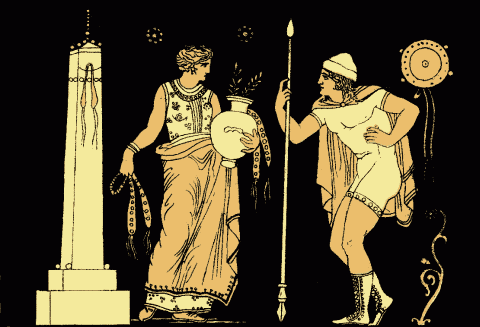In response to the performance of Electra I have to be honest, I was a little unimpressed. I really
enjoyed reading the play because I felt like there was a lot of emotion
attached to it. In the play I thought that they made light of something that
was supposed to be dark and full and as such I wasn’t really connected to the
characters.
But analyzing whether or not this play is a tragedy is much
more interesting that my opinion of the performance. Looking at the
requirements that Aristotle put forth as requirements for a tragedy, it is
clear to see that Electra does not completely line up. Among other
requirements, the greatest one Aristotle put forth is that the character must
have a tragic flaw and some sort of downfall that instills pity and fear into
the audience. The reason why is because of a resolution effect that happens
with the audience when the pity and fear are felt.
 My argument is that Electra,
as it is presented, is not a tragedy, but could very well become one if you
change the perspective you are looking through. The play, as it is written,
compels you to look at the situation through the eyes of Electra. This being
the case, we may see flaws in Electra but they are not tragic because there is no
downfall to accompany those flaws. In reality, Electra gets everything she
wants.
My argument is that Electra,
as it is presented, is not a tragedy, but could very well become one if you
change the perspective you are looking through. The play, as it is written,
compels you to look at the situation through the eyes of Electra. This being
the case, we may see flaws in Electra but they are not tragic because there is no
downfall to accompany those flaws. In reality, Electra gets everything she
wants.
But it is obvious that quite a few people in this class have
already made this argument. Therefore I am going to extend my argument to this:
This play COULD be identified as a tragedy. If we were to shift our focus and
look through the eyes of Clytemnestra
or Aegisthus you would see that their tragic flaws were lust and pride. That
their downfall was the rebellion of their children and their own death. If this
were the case it would make much more sense to classify this as a tragedy.
I actually want to disagree a little bit. I think that Electra does have a tragic flaw. Her rage blinds her to the point that she kills her own mother. Although she justifies why she must kill her and then ends up 'getting what she wants' in the end, she's wrought with guilt over what she's done. Then again, I watched to movie instead of the play and the movie seemed to be a little more serious and dark than people are describing the play to have been.
ReplyDeleteIt's hard to completely classify this as a tragedy or not. Like you said Alexis, her rage does blind her to the point of feeling remorse for what she's done. However I can't see it being that black and white.
ReplyDeleteJon, great insight. I cannot say that pity or fear was instilled in me from the play. If I analyzed Electra's character more, I am sure I could come up with some sort of Katharsis and connection, but at face value I don't think Electra is necessarily a tragedy.
ReplyDeleteThe Greeks didn't stick to the black and white spectrum in the moral area and tended to dabble in shades of grey. But in essence it's ultimately the delivery of the words and directions that can bring the true message out, which this didn't do. Greeks had a odd sense of teaching lessons in tragedies and myths that one doesn't see in today's age.
ReplyDelete